- Home
- Jane Smiley
The Age of Grief Page 7
The Age of Grief Read online
Page 7
“Made it!” Kirby says. That is all he will say about the trip. The last thing he wants to do is start a discussion about near misses. Compared with some of Harold’s near misses, this is nothing. In fact, near misses on the highway aren’t worth mentioning unless a lot of damage has been done to the car. Kirby knows of near misses that Harold has never dared to describe to anyone besides him, because they show a pure stupidity that even Harold has the sense to be ashamed of.
At dinner, over sweet and savory Nordic fare that Kirby is used to but doesn’t much like, the people around the table, his relatives, waver in the smoky candlelight, and Kirby imagines that he can feel the heat of the flames on his face. The other people at the table seem unfamiliar. Leanne, Harold’s wife, he has seen only once, at their wedding. She is handsome and self-possessed-looking, but she sits at the corner of the table, like a guest in her own house. Eric sits at the head, and Mary Beth, his wife, jumps up and down to replenish the food. This assumption of primogeniture is a peculiarity of Eric’s that has always annoyed Kirby, but even aside from that they have never gotten along. Eric does his best—earnest handshake and smile each time they meet, two newsy letters every year, pictures of the children (known between Harold and Kirby as “the little victims”). Eric has a Ph.D. from Columbia in American history, but he does not teach. He writes for a conservative think tank, articles that appear on the op-ed pages of newspapers and in the think tank’s own publications. He specializes in “the family.” Kirby and Harold have made countless jokes at Eric’s expense. Kirby knows that more will be made this trip, if only in the form of conspiratorial looks, rolling eyes. Eric’s hobby—Mary Beth’s, too, for they share everything—is developing each nuance of his Norwegian heritage into a fully realized ostentation. Mary Beth is always busy, usually baking. That’s all Kirby knows about her, and all he cares to know.
Across the table Anna, their older daughter, pale, blue-eyed, cool, seems to be staring at him, but Kirby can hardly see her. He is thinking about Mieko. Kirby looks at his watch. It is very early morning in Osaka. She is probably about to wake up. Her disappointment will have receded hardly a particle, will suck her down as soon as she thuds into consciousness. “Oh, oh, oh”: he can hear her cries as clearly as if they were still vibrating in the air. He is amazed at having heard such a thing, and he looks carefully at the women around the table. Mieko would be too eager to please here, always looking after Mary Beth and Leanne, trying to divine how she might be helpful. Finally, Mary Beth would speak to her with just a hint of sharpness, and Mieko would be crushed. Her eyes would seek Kirby’s for reassurance, and he would have none to give. She would be too little, smaller even than Anna, and her voice would be too high and quick. These thoughts give him such pain that he stares for relief at Kristin, Eric’s youngest, age three, who is humming over her dinner. She is round-faced and paunchy, with dark hair cut straight across her forehead and straight around her collar. From time to time she and Leanne exchange merry glances.
Harold is beside him; that, at least, is familiar and good, and it touches Kirby with a pleasant sense of expectation, as if Harold, at any moment, might pass him a comic book or a stick of gum. In fact, Harold does pass him something—an icy cold beer, which cuts the sweetness of the food and seems to adjust all the figures around the table so that they stop wavering.
• • •
Of course his eyes open well before daylight, but he dares not move. He is sharing a room with Harold the younger, Eric’s son, whose bed is between his and the door. He worries that if he gets up he will stumble around and crash into walls and wake Harold. The digits on the clock beside Harold’s bed read 5:37, but when Kirby is quiet he can hear movement elsewhere in the house. When he closes his eyes the footsteps present themselves as a needle and thread, stitching a line through his thoughts. He has just been driving. His arms ache from gripping the wheel. The car slides diagonally across the road, toward the median. It slides and slides, through streams of cars, toward a familiar exit, the Marshalltown exit, off to the left, upward. His eyes open again. The door of the room is open, and Anna is looking in. After a moment she turns and goes away. It is 6:02. Sometime later Leanne passes with Isaac, the baby, in her arms.
Kirby cannot bear to get up and face his brothers and their families. As always, despair presents itself aesthetically. The image of Harold and Leanne’s living room, matching plaid wing chairs and couch, a triple row of wooden pegs by the maple front door, seems to Kirby the image of the interior of a coffin. The idea of spending five years, ten years, a lifetime, with such furniture makes him gasp. But his own apartment, armchair facing the television, which sits on a spindly coffee table, is worse. Mary Beth and Eric’s place, where he has been twice, is the worst, because it’s pretentious; they have antique wooden trunks and high-backed benches painted blue with stenciled flowers in red and white. Everything, everything, they own is blue and white, or white with blue, and Nordic primitive. Now even the Japanese images he calls up are painful. The pearly white Japanese-style room in Akira’s house was bitterly cold in the winter, and he spent one night there only half-sleeping, his thighs drawn to his chest, the perimeters of the bed too cold even to touch. His head throbbing, Kirby lies pinned to the bed by impossibility. He literally can’t summon up a room, a stick of furniture, that he can bear to think of. Harold the younger rolls over and groans, turning his twelve-year-old face toward Kirby’s. His mouth opens and he breathes noisily. It is 6:27.
At breakfast, Leanne sets a bowl of raisin bran before him, and he is struck by the elasticity of her motion. She smiles, so cool and kind that Kirby is suddenly daunted. Ten minutes later, when Anna enters the kitchen in her bathrobe, yawning, he recalls, suddenly, her appearance in the doorway to his room. Fifth grade. Only fifth grade. He can see that now, but the night before, and in the predawn darkness, she had seemed older, more threatening, the way girls get at fourteen and fifteen. “Cereal, sweetie?” Leanne says, and Anna nods, scratching. She sits down without a word and focuses on the back of the Cheerios box. Kirby decides that he was dreaming and puts the incident out of his mind; but, “sweetie”—he would like for Leanne to call him that.
Harold, of course, is at his store, managing the Christmas rush, and the house is less festive in his absence. Eric has sequestered himself in Leanne’s sewing room, with his computer, and as soon as Anna stands up from breakfast, Mary Beth begins to arrange the day’s kitchen schedule. Kirby rinses his cup and goes into the living room. It is nine in the morning, and the day stretches before him, empty. He walks through the plaid living room to the window, where he regards the outdoor thermometer. It reads four degrees below zero. Moments later it is five degrees below zero. Moments after that he is standing beside Harold’s bar, pouring himself a glass of bourbon. He has already drunk it when Anna appears in the doorway, dressed now, and staring at him again. She makes him think of Mieko again—though the child is blond and self-contained, she is Mieko’s size. Last evening, when he was thinking of Mieko, he was looking at Anna. He says, attempting jovial warmth, “Good morning, Anna. Why do you keep staring at me?”
She is startled. “I don’t. I was looking at the bookshelves.”
“But you stared at me last night, at dinner. And you came to the door of my room early this morning. I know because I was awake.”
“No, I didn’t.” But then she softens, and says with eager curiosity, “Are you a socialist?”
While Kirby is trying not to laugh, he hears Mary Beth sing from the kitchen. “Anna? Your brother is going sledding. You want to go?”
Anna turns away before Kirby can answer and mounts the stairs. A “No!” floats, glassy and definite, from the second floor.
Kirby sits down in one of the plaid armchairs and gazes at an arrangement of greenery and shiny red balls and candles that sits on a table behind the couch. He gazes and gazes, contemplating the notion of Eric and Mary Beth discussing his politics and his life. He is offended. He knows that if he were to get
up and do something he would stop being offended, but he gets up only to pour himself another drink. It is nearly ten. Books are around everywhere, and Kirby picks one up.
People keep opening doors and coming in, having been elsewhere. Harold comes home for lunch, Leanne and Isaac return from the grocery store and the hardware store, Harold the younger stomps in, covered with snow from sledding, eats a sandwich, and stomps out again. Eric opens the study door, takes a turn through the house, goes back into the study again. He does this three times, each time failing to speak to Kirby, who is sitting quietly. Perhaps he does not see him. He is an old man, Kirby thinks, and his ass has spread considerably in the past four years; he is thirty-six going on fifty, round-shouldered, wearing slacks rather than jeans. What a jerk.
But then Kirby’s bad mood twists into him, and he lets his head drop on the back of his chair. What is a man? Kirby thinks. What is a man, what is a man? It is someone, Eric would say, who votes, owns property, has a wife, worries. It is someone, Harold would say, who can chop wood all day and fuck all night, who can lift his twenty-five-pound son above his head on the palm of his hand.
After lunch the men have all vanished again, even Isaac, who is taking a nap. In various rooms the women do things. They make no noise. Harold’s house is the house of a wealthy man, Kirby realizes. It is large enough to be silent and neat most of the time, the sort of house Kirby will never own. It is Harold and Eric who are alike now. Only Kirby’s being does not extend past his fingertips and toes to family, real estate, reputation.
Sometime in the afternoon, when Kirby is still sitting quietly and his part of the room is shadowed by the movement of the sun to the other side of the house, Kristin comes in from the kitchen, goes straight to the sofa, pulls off one of the cushions, and begins to jump repeatedly from the cushion to the floor. When he says, “Kristin, what are you doing?” she is not startled. She says, “Jumping.”
“Do you like to jump?”
She says, “It’s a beautiful thing to do,” in her matter-of-fact, deep, three-year-old voice. Kirby can’t believe she knows what she is saying. She jumps three or four more times and then runs out again.
At dinner she is tired and tiresome. When Eric tells her to eat a bite of her meat (ham cooked with apricots), she looks him right in the face and says, “No.”
“One bite,” he says. “I mean it.”
“No. I mean it.” She looks up at him. He puts his napkin on the table and pushes back his chair. In a moment he has swept her through the doorway and up the stairs. She is screaming. A door slams and the screaming is muffled. When he comes down and seats himself, carefully laying his napkin over his slacks, Anna says, “It’s her body.”
The table quiets. Eric says, “What?”
“It’s her body.”
“What does that mean?”
“She should have control over her own body. Food. Other stuff. I don’t know.” She has started strong but weakens in the face of her father’s glare. Eric inhales sharply, and Kirby cannot restrain himself. He says, “How can you disagree with that? It sounds self-evident to me.”
“Does it? The child is three years old. How can she have control over her own body when she doesn’t know anything about it? Does she go out without a coat if it’s twenty below zero? Does she eat only cookies for three days? Does she wear a diaper until she’s five? This is one of those phrases they are using these days. They all mean the same thing.”
“What do they mean?” As Kirby speaks, Leanne and Mary Beth look up, no doubt wishing that he had a wife or a girl friend here to restrain him. Harold looks up, too. He is grinning.
Eric shifts in his chair, uncomfortable, Kirby suddenly realizes, at being predictably stuffy once again. Eric says, “It’s Christmas. Let’s enjoy it.”
Harold says, “Principles are principles, any day of the year.”
Eric takes the bait and lets himself say, “The family is constituted for a purpose, which is the sometimes difficult socialization of children. For a certain period of their lives others control them. In early childhood others control their bodies. They are taught to control themselves. Even Freud says that the young barbarian has to be taught to relinquish his feces, sometimes by force.”
“Good Lord, Eric,” Leanne says.
Eric is red in the face. “Authority is a principle I believe in.” He looks around the table and then at Anna, openly angry that she has gotten him into this. Across Anna’s face flits a look that Kirby has seen before, has seen on Mieko’s face, a combination of self-doubt and resentment molded into composure.
“Patriarchy is what you mean,” Kirby says, realizing from the tone of his own voice that rage has replaced sympathy and, moreover, is about to get the better of him.
“Why not? It works.”
“For some people, at a great cost. Why should daughters be sacrificed to the whims of the father?” He should stop now. He doesn’t. “Just because he put his dick somewhere once or twice.” The result of too many bourbons too early in the day.
“In my opinion—” Eric seems not to notice the vulgarity, but Harold, beside Kirby, snorts with pleasure.
“I don’t want to talk about this,” Leanne says. Kirby blushes and falls silent, knowing that he has offended her. It is one of those long holiday meals, and by the time they get up from the table, Kirby feels as if he has been sitting in a dim, candlelit corner most of his life.
There is another ritual—the Christmas Eve unwrapping of presents—and by that time Kirby realizes that he is actively intoxicated and had better watch his tone of voice and his movements. Anna hands out the gifts with a kind of rude bashfulness, and Kirby is surprised at the richness of the array: from Harold he has gotten a cotton turtleneck and a wool sweater, in bright, stylish colors; from Leanne a pair of very fancy gloves; from Isaac three pairs of Ragg wool socks; from Eric’s family, as a group, a blue terry-cloth robe and sheepskin slippers. When they open his gifts, he is curious to see what the wrappings reveal: he has bought it all so long before. Almost everything is some gadget available in Japan but not yet in the States. Everyone peers and oohs and aahs. It gives Kirby a headache and a sense of his eyeballs expanding and contracting. Tomorrow night he will be on his way home again, and though he cannot bear to stay here, after all, he cannot bear to leave either.
He drifts toward the stairs, intending to go to bed, but Harold looms before him, grinning and commanding. “Your brain needs some oxygen, brother,” he says. Then they are putting on their parkas, and then they are outside, in a cold so sharp that Kirby’s nose, the only exposed part of him, stings. Harold strides down the driveway, slightly ahead of him, and Kirby expects him to speak, either for or against Eric, but he doesn’t. He only walks. The deep snow is so solidly frozen that it squeaks beneath their boots. The only thing Harold says the whole time they are walking is, “Twenty-two below, not counting the wind chill. Feels good, doesn’t it?”
“Feels dangerous,” Kirby says.
“It is,” Harold says.
The neighborhood is brightly decorated, and the colored lights have their effect on Kirby. For the first time in three Christmases he feels a touch of the mystery that he thinks of as the Christmas spirit. Or maybe it is love for Harold.
Back at the house, everyone has gone to bed except Leanne and Mary Beth, who are drying dishes and putting them away. They are also, Kirby realizes—after Harold strides through the kitchen and up the stairs—arguing, although with smiles and in polite tones. Kirby goes to a cabinet and lingers over getting himself a glass for milk. Mary Beth says, “Kristin will make the connection. She’s old enough.”
“I can’t believe that.”
“She saw all the presents being handed out and unwrapped. And Anna will certainly make the connection.”
“Anna surely doesn’t believe in Santa Claus anymore.”
“Unofficially, probably not.”
“It’s Isaac’s first Christmas,” Leanne says. “He’ll like all the wrappings.”<
br />
“I wish you’d thought of that before you wrapped the family presents and his Santa presents in the same paper.”
“That’s a point, too. They’re his presents. I don’t think Kristin will notice them.”
“If they’re the only wrapped presents, she will. She notices everything.”
Now Leanne turns and gazes at Mary Beth, her hands on her hips. A long silence follows. Leanne flicks a glance at Kirby, who pretends not to notice. Finally she says, “All right, Mary Beth. I’ll unwrap them.”
“Thank you,” Mary Beth says. “I’ll finish this, if you want.” Kirby goes out of the kitchen and up to his bedroom.
The light is already off, and Harold the younger is on his back, snoring.
When he gets up an hour later, too drunk to sleep, Kirby sees Leanne arranging the last of Santa’s gifts under the tree. She turns the flash of her glance upon him as he passes through the living room to the kitchen. “Mmm,” he says, uncomfortable, “can’t sleep.”
“Want some cocoa? I always make some before I go to bed.”
He stops. “Yeah. Why not? Am I mistaken, or have you been up since about six a.m.?”
“About that. But I’m always wired at midnight, no matter what.”
He follows her into the kitchen, remembering now that they have never conversed and wishing that he had stayed in bed. He has drunk himself stupid. Whatever words he has in him have to be summoned from very far down. He sits at the table. After a minute he puts his chin in his hand. After a long, blank, rather pleasant time, the cocoa is before him, marshmallow and all. He looks at it. When Leanne speaks, Kirby is startled, as if he had forgotten that she was there.
“Tired?” she says.
“Too much to drink.”
“I noticed.”
“I don’t have anything more to say about it.”
“I’m not asking.”
He takes a sip of his cocoa. He says, “Do you all see much of Eric and family?”

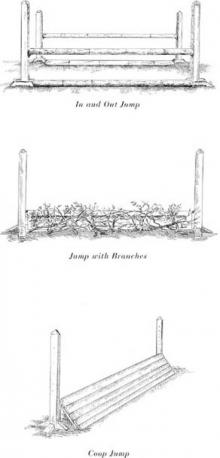 The Georges and the Jewels
The Georges and the Jewels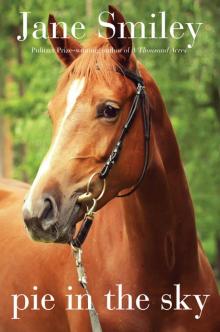 Pie in the Sky: Book Four of the Horses of Oak Valley Ranch
Pie in the Sky: Book Four of the Horses of Oak Valley Ranch Duplicate Keys
Duplicate Keys Charles Dickens
Charles Dickens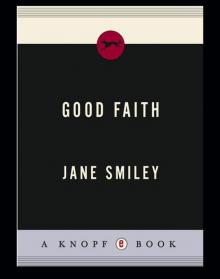 Good Faith
Good Faith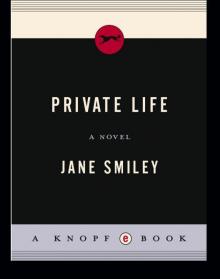 Private Life
Private Life A Thousand Acres: A Novel
A Thousand Acres: A Novel The Greenlanders
The Greenlanders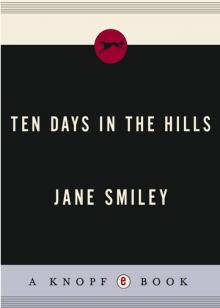 Ten Days in the Hills
Ten Days in the Hills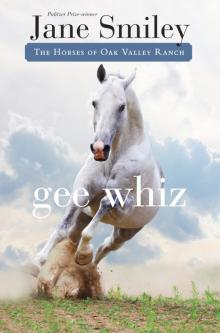 Gee Whiz: Book Five of the Horses of Oak Valley Ranch
Gee Whiz: Book Five of the Horses of Oak Valley Ranch A Thousand Acres
A Thousand Acres The All-True Travels and Adventures of Lidie Newton
The All-True Travels and Adventures of Lidie Newton Ordinary Love and Good Will
Ordinary Love and Good Will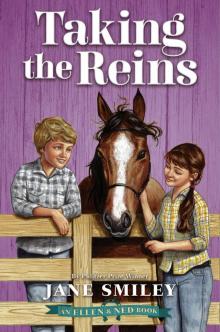 Taking the Reins (An Ellen & Ned Book)
Taking the Reins (An Ellen & Ned Book) The Man Who Invented the Computer
The Man Who Invented the Computer Horse Heaven
Horse Heaven The Age of Grief
The Age of Grief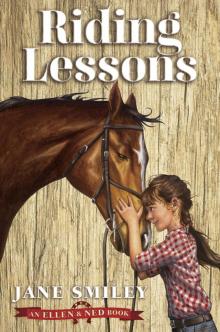 Riding Lessons
Riding Lessons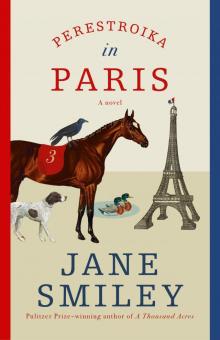 Perestroika in Paris
Perestroika in Paris A Good Horse: Book Two of the Horses of Oak Valley Ranch
A Good Horse: Book Two of the Horses of Oak Valley Ranch Saddles & Secrets (An Ellen & Ned Book)
Saddles & Secrets (An Ellen & Ned Book)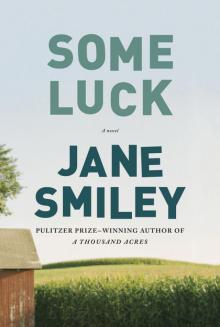 Some Luck: A Novel
Some Luck: A Novel Champion Horse
Champion Horse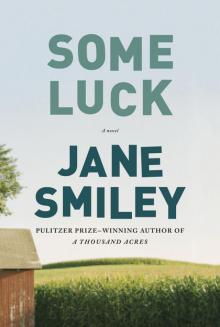 Some Luck
Some Luck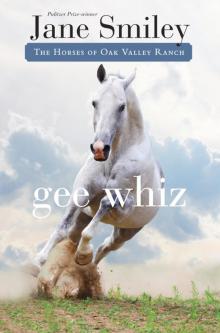 Gee Whiz
Gee Whiz Barn Blind
Barn Blind A Thousand Acres (1992 Pulitzer Prize)
A Thousand Acres (1992 Pulitzer Prize)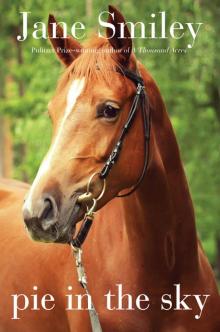 Pie in the Sky
Pie in the Sky True Blue
True Blue A Thousand Acres_A Novel
A Thousand Acres_A Novel A Good Horse
A Good Horse